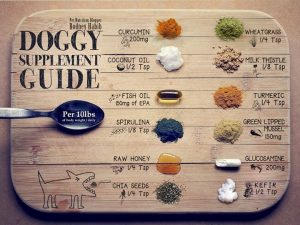What Are The Benefits Of Supplements?

If you are feeding a good quality complete food then there are arguments to say that supplements are not needed – the food should have everything that the dog needs to remain healthy. However there are many occasions when it is beneficial to provide additional supplements.
The needs of the dog change over time – sometimes it’s a gradual change, for example as the dogs gets older, and sometimes it’s a sudden change due to illness or injury. As the dog gets older, his/her body will incur more ‘wear and tear’, particularly in the joints and other moving parts. Whilst there are senior dog foods that contain the supplements most common for joint pain (glucosamine, chondroitin, MSM, green lipped mussel), for whatever reason you may not want to change the food just to get these additional components so instead you can opt for a supplement. In the case of a more sudden change from illness or injury, a food that was suitable for the dog as a maintenance diet may not have the additional nutrients to help the dog recover from that illness or injury, so short term supplementation could help (for example, extra Vitamin C in times of stress). There are also natural anti-inflammatories and natural painkillers that can be used at times of injury that reduce or even prevent the need for drugs, and natural products are so much better for the dog. Cancer and allergies can also be supported with supplements – indeed, if a dog has allergies to local pollens (tree, flowers, grass), then feeding a local honey can help the dog overcome this allergy.
Vitamins in dry dog food tend to be synthetic and so not as beneficial to the dog – the natural vitamins in the raw ingredients are frequently destroyed by air and heating, so synthetic vitamins are added back in to make the food complete. Digestive enzymes are also destroyed by heat, and fatty acids can become rancid – due to this, commercial food tends to be high in Omega 6 and low in Omega 3. So although a food is deemed to be complete, the nutrients aren’t necessarily readily available to a dog and supplementing with natural vitamins is much better for the dog than relying on synthetic vitamins.
Take Care When Purchasing Supplements
The main issue to be wary of when purchasing supplements and feeding them to a dog is that these supplements are not well regulated and many do not have any nutritional value. Many supplements may contain synthetic ingredients themselves, rather than the natural products that are so much better for dogs.
You also need to be aware of the impact of adding them to your dog’s food – are you already feeding a complete and balanced dog food? Will you be creating an imbalance in nutrients and possible toxicity if you add supplements that are already contained in the food? – creating a level of toxicity is more likely if synthetic vitamins have been used in either the food itself or the supplement.
Only limited studies have been conducted on the safety and effectiveness of vitamin and herbal supplements for dogs and cats – if they are not effective then you are just wasting your money, but if they are not safe then you could be putting your dog’s health at risk.
Dosages can also be difficult to determine – dogs vary so much in size and hence need different volumes of nutrients, and on top of this different complete dog foods have different formulations and hence ratios of nutrients. How can you easily determine what the correct dosage is for your particular dog based on the food you currently feed?
You should also be wary of using human grade supplements as they may contain ingredients that are not harmful to humans but are harmful to dogs. Wherever possible use supplements that are naturally what dogs would eat.
